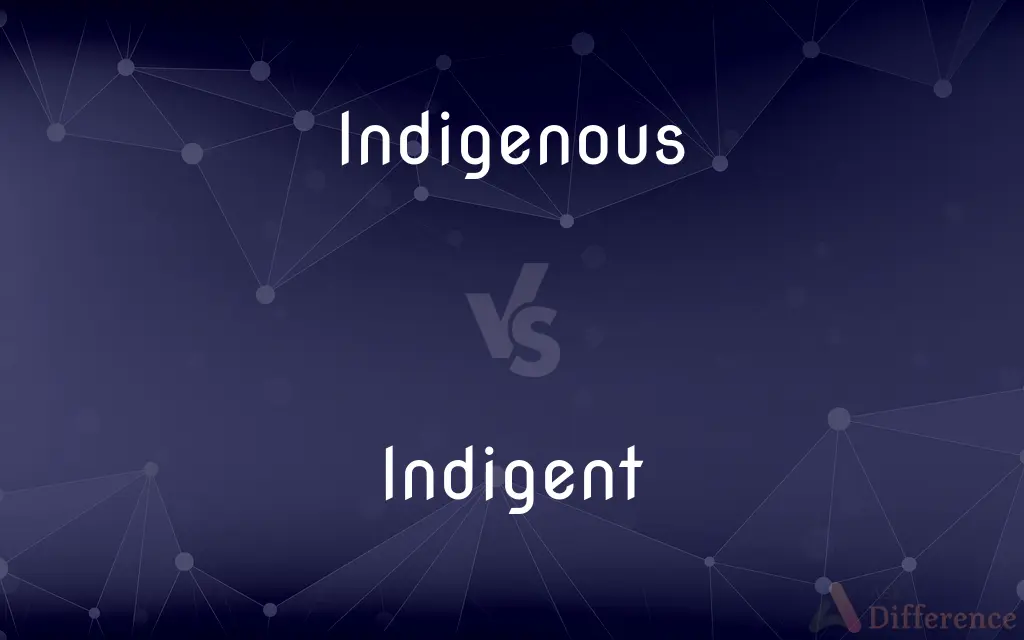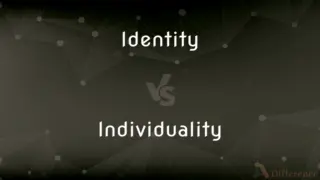Indigenous vs. Indigent — What's the Difference?
By Fiza Rafique & Maham Liaqat — Updated on March 25, 2024
"Indigenous" refers to people or things native to a region, deeply connected to cultural or historical roots, whereas "indigent" describes individuals or groups in severe poverty, lacking basic resources.

Difference Between Indigenous and Indigent
Table of Contents
ADVERTISEMENT
Key Differences
"Indigenous" people or things are those originating in and naturally occurring in a particular place or environment, highlighting a deep cultural, historical, and environmental connection. For example, indigenous tribes of the Amazon have traditions and lifestyles that are closely tied to their ancestral lands. On the other hand, "indigent" refers to people who are extremely poor and unable to provide for their basic needs, such as food, clothing, and shelter. This term is often used in legal and social contexts to describe individuals or populations in need of assistance.
While "indigenous" emphasizes a belonging and an intrinsic relationship to a specific location or community, celebrating the unique cultures, languages, and practices developed over generations, "indigent" underscores a condition of financial hardship and social vulnerability. The former is associated with identity and heritage, whereas the latter with socio-economic status and the necessity for societal support.
The concept of being "indigenous" is often associated with rights and movements that advocate for the recognition and protection of native lands, cultures, and languages, reflecting a struggle for self-determination and respect for ancestral legacies. In contrast, "indigent" individuals may seek aid and interventions from governments and charitable organizations to alleviate their conditions, which is a matter of social justice and equity rather than cultural preservation.
Indigenous populations may face various challenges, including threats to their lands, cultures, and livelihoods due to external pressures and modernization. However, their identity as "indigenous" is a source of pride and resilience, rooted in a deep connection to their ancestry and environment. Conversely, being "indigent" is typically seen as a disadvantageous state, requiring external assistance and policies aimed at poverty reduction and improving living standards.
"Indigenous" can also apply to flora and fauna that are native to a specific region, contributing to the biodiversity and ecological balance of their habitats. This usage underscores the importance of conservation and the natural heritage of a region. Meanwhile, the term "indigent" lacks a direct correlation with the environment or biodiversity, focusing solely on the human condition of poverty and the need for compassionate responses.
ADVERTISEMENT
Comparison Chart
Definition
Originating naturally in a specific place or environment, relating to native peoples.
Experiencing severe poverty, unable to meet basic personal needs.
Key Focus
Cultural, historical, and environmental connection to a location.
Socio-economic status and lack of resources.
Associated Concepts
Heritage, rights, ancestral lands, traditions.
Poverty, aid, social welfare.
Examples
Indigenous tribes of North America, indigenous species of plants in a rainforest.
Indigent individuals seeking aid, homeless populations.
Social Implications
Advocacy for recognition, protection of lands and cultures, self-determination.
Need for social support, government aid, charity.
Compare with Definitions
Indigenous
Inherent or innate.
An indigenous sense of pride is evident in their community.
Indigent
Extremely poor or needy.
The charity focuses on helping the indigent.
Indigenous
Relating to flora or fauna originating in a specific region.
These plants are indigenous to the region.
Indigent
Dependent on charity.
Shelters provide meals for indigent individuals.
Indigenous
Pertaining to the first inhabitants.
The museum features artifacts from indigenous peoples.
Indigent
Eligible for public assistance.
Indigent patients receive free medical care.
Indigenous
Originating or occurring naturally in an area.
Kangaroos are indigenous to Australia.
Indigent
In severe want.
Food drives aim to alleviate the conditions of the indigent.
Indigenous
Native to a specific place.
Indigenous cultures have rich traditions.
Indigent
Lacking basic necessities due to poverty.
Indigent families often need external support.
Indigenous
Originating or occurring naturally in a particular place; native
The indigenous peoples of Siberia
Coriander is indigenous to southern Europe
Indigent
Experiencing want or need; impoverished
Distributed food to indigent families.
Indigenous
Originating, growing, or produced in a certain place or region.
Indigent
(Archaic) Lacking or deficient.
Indigenous
Being a member of the original inhabitants of a particular place.
Indigent
A poor or destitute person.
Indigenous
Of, belonging to, or characteristic of such inhabitants.
Indigent
Poor; destitute; in need.
Indigenous
Born or originating in, native to a land or region, especially before an intrusion.
Indigent
(archaic) Utterly lacking or in need of something specified.
Indigenous
In particular, of or relating to a people (or their language or culture) that inhabited a region prior to the arrival of people of other cultures which became dominant (e.g., through colonialism), and which maintains a distinct culture.
The Ainu are the indigenous ethnic group of Japan's Hokkaido Island.
Indigent
A person in need, or in poverty.
Indigenous
Innate, inborn.
Indigent
Wanting; void; free; destitute; - used with of.
Indigenous
Native; produced, growing, or living, naturally in a country or climate; not exotic; not imported.
Negroes were all transported from Africa and are not indigenous or proper natives of America.
In America, cotton, being indigenous, is cheap.
Indigent
Destitute of property or means of comfortable subsistence; needy; poor; in want; necessitous.
Indigent faint souls past corporal toil.
Charity consists in relieving the indigent.
Indigenous
Native; inherent; innate.
Joy and hope are emotions indigenous to the human mind.
Indigent
Poor enough to need help from others
Indigenous
Originating where it is found;
The autochthonal fauna of Australia includes the kangaroo
Autochthonous rocks and people and folktales
Endemic folkways
The Ainu are indigenous to the northernmost islands of Japan
Common Curiosities
Can indigenous people also be indigent?
Yes, indigenous people can also experience indigence, often due to socio-economic disparities and historical injustices.
How do societies assist indigent individuals?
Societies assist indigent individuals through social welfare programs, charitable organizations, and legal aid services.
What does indigent mean?
Indigent means experiencing severe poverty, to the point of being unable to afford basic personal needs.
What defines someone as indigenous?
Someone is defined as indigenous if they are native to a particular region, with deep ancestral and cultural connections to that place.
How are indigenous rights protected?
Indigenous rights are protected through international laws, treaties, and national legislations that recognize their land rights, cultural heritage, and self-determination.
How can one help indigent individuals?
Helping indigent individuals can involve donating to charities, volunteering, advocating for policy changes, and supporting social programs.
Why is preserving indigenous cultures important?
Preserving indigenous cultures is important for maintaining cultural diversity, historical heritage, and the invaluable knowledge of traditional practices and environmental stewardship.
What role do indigenous peoples play in environmental conservation?
Indigenous peoples play a crucial role in environmental conservation through their traditional knowledge, sustainable practices, and stewardship of natural resources.
What are common challenges faced by indigent populations?
Common challenges include lack of housing, food insecurity, limited access to healthcare, and social exclusion.
What impact does indigence have on society?
Indigence impacts society by highlighting issues of inequality, requiring resources for aid, and motivating social policy development.
What contributes to the indigence of a population?
Factors include economic downturns, unemployment, lack of education, social inequalities, and health issues.
How is indigence measured?
Indigence is often measured by income levels, access to basic services, and living conditions, among other socioeconomic indicators.
Are there specific laws for indigenous peoples?
Yes, there are specific laws and agreements, like the UN Declaration on the Rights of Indigenous Peoples, aimed at protecting their rights and interests.
What are the benefits of supporting indigenous communities?
Supporting indigenous communities benefits cultural preservation, biodiversity, environmental sustainability, and promotes social justice.
How can society address indigence effectively?
Society can address indigence effectively through comprehensive social welfare systems, education, economic opportunities, and supportive legal frameworks.
Share Your Discovery

Previous Comparison
Alicorn vs. Pegasus
Next Comparison
Identity vs. IndividualityAuthor Spotlight
Written by
Fiza RafiqueFiza Rafique is a skilled content writer at AskDifference.com, where she meticulously refines and enhances written pieces. Drawing from her vast editorial expertise, Fiza ensures clarity, accuracy, and precision in every article. Passionate about language, she continually seeks to elevate the quality of content for readers worldwide.
Co-written by
Maham Liaqat













































